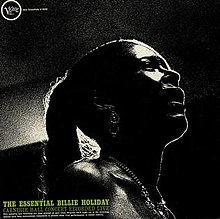The Essential Billie Holiday: Carnegie Hall Concert Recorded Live
| The Essential Billie Holiday: Carnegie Hall Concert Recorded Live | ||||
|---|---|---|---|---|
 |
||||
| Live album by Billie Holiday | ||||
| Released | 1961 (expanded CD 1989) | |||
| Recorded | November 10, 1956 | |||
| Genre | Vocal jazz | |||
| Length | 44:40 | |||
| Label | Verve | |||
| Producer | Norman Granz | |||
| Billie Holiday chronology | ||||
|
||||
The Essential Billie Holiday: Carnegie Hall Concert Recorded Live is a live album by jazz singer Billie Holiday, recorded November 10, 1956 at Carnegie Hall in New York. The two concerts that night served as promotion for Billie Holiday's autobiography Lady Sings the Blues.
On November 10, 1956, Holiday performed two concerts before packed audiences at Carnegie Hall, a major accomplishment for any artist, especially a black artist of the segregated period of American history.
Interspersed among Holiday's songs, Gilbert Millstein of The New York Times read aloud four lengthy passages from her autobiography Lady Sings the Blues. The narrated parts of the concerts were originally not included until the re-release on CD in 1989.
In the liner notes of the album Millstein wrote:
The narration began with the ironic account of her birth in Baltimore – 'Mom and Pop were just a couple of kids when they got married. He was eighteen, she was sixteen, and I was three' – and ended, very nearly shyly, with her hope for love and a long life with 'my man' at her side.
Millstein continued:
It was evident, even then, that Miss Holiday was ill. I had known her casually over the years and I was shocked at her physical weakness. Her rehearsal had been desultory; her voice sounded tinny and trailed off; her body sagged tiredly. But I will not forget the metamorphosis that night. The lights went down, the musicians began to play and the narration began. Miss Holiday stepped from between the curtains, into the white spotlight awaiting her, wearing a white evening gown and white gardenias in her black hair. She was erect and beautiful; poised and smiling. And when the first section of narration was ended, she sang – with strength undiminished – with all of the art that was hers. I was very much moved. In the darkness, my face burned and my eyes. I recall only one thing. I smiled.
The critic Nat Hentoff of Down Beat magazine, who attended the Carnegie Hall concert, wrote the remainder of the sleeve notes on the 1961 album. He wrote of Holiday's performance:
Throughout the night, Billie was in superior form to what had sometimes been the case in the last years of her life. Not only was there assurance of phrasing and intonation; but there was also an outgoing warmth, a palpable eagerness to reach and touch the audience. And there was mocking wit. A smile was often lightly evident on her lips and her eyes as if, for once, she could accept the fact that there were people who did dig her.
...
Wikipedia
